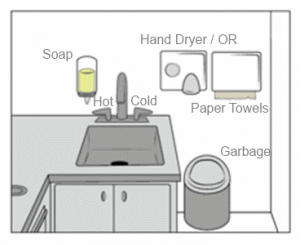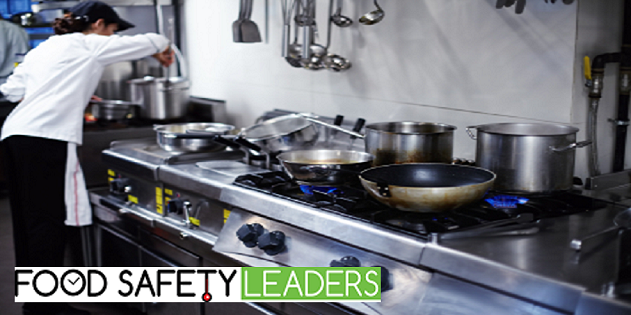Don’t Eat Poop! Why Proper Hand-washing is critical

3 Ways Food Safety Training Can Increase Profits (Updated)
August 21, 2017
Food Safety and Home-based Businesses
August 21, 2017OK, so I’m sure you’ve heard that hand-washing is a good thing. It’s also a requirement in most food regulations. If you are a food business owner or a health-conscious person then you probably want people preparing your food to wash their hands. Staff that don’t wash their hands are likely to get their co-workers sick (which is bad for business) and/or customers sick (also bad for business).
So how do you get your staff to wash their hands when the rush is on. You know; those times where the orders are piling up, the line ups are getting bigger and everyone’s patience is wearing thin. Here are 3 ways that can help you make hand-washing a priority in your business:
Designate Hand-wash Stations for Hand-washing Only!
When I inspected restaurants the one thing that drove me crazy (ok there are more “things” but this one tops the list) is when hand wash stations get used for other things such as dirty dishes, or cleaning buckets. Hand-wash stations need to be accessible people. If you want food handlers to actually wash their hands, then make it a requirement to keep the hand wash sink designated only for hand-washing. You can encourage/enforce this by constantly checking that the sink is accessible, well stocked with soap and paper towels.
Post Hand-washing Posters
Placing hand-washing posters (we have a nice one here for free – sign up and we’ll send it you ) all over your kitchen will remind staff to wash their hands. After all who doesn’t need a reminder every once in a while.
Provide Alcohol-based Hand Sanitizers
Alcohol based hand sanitizers can be useful but they have their limitations. They do not work as well if your hands are dirty. When you have food crud or other dirt on your hands, hand-washing with soap and water is the way to go. If your hands are not visibly dirty, alcohol based sanitizers can be a good way to go.
This is especially important to note for anyone that prepares and serves food during outdoor festivals or other events where hand-washing stations may not be readily available. Here’s how to use Alcohol based hand sanitizers:
- Apply a palmful of the product in a cupped hand.
- Rub hands together, ensuring you cover all surfaces (including front and back of hands and between fingers).
- Continue to rub your hands together until they are dry.
Keep in mind that hand hygiene is one of the most important interventions that food handlers can do to minimise food-borne illness. As a restaurant owner/manager it’s important to “set the tone” and “lead by example” when it comes to hand-washing.
Also consider making hand hygiene a regular conversation with your staff. You can point out the posters for them in a “show and tell” type session at your staff meetings or come up with creative games to keep hand-washing a priority. I had a friend that used to do hand-washing information sessions at schools and his favourite way to get the kids to understand the importance of hand-washing was to illustrate the fecal-oral route. He would describe someone going to the bathroom, not properly washing their hands and then a nice person would shake their hand and the unwashed poop would be transferred to this next individual (or the poor volunteer kids in his demonstration). He would show how the “poop” can then be consumed if the person eats his lunch again without washing his hands first. The kids would all be left with the catch phrase “don’t eat poop”. Judging from their horrified little faces I would say the message will probably stay with them for a long time.
Finally, these things may seem really simple, and they are, but sometimes the simple things are the ones that get forgotten and when that happens the consequences are huge.
If you remember anything from this post remember this:
Washing hands prevents disease and puts everyone else at ease!
Sources:
“The Benefits of Handwashing”. Government of Canada. Minister of Health, May 2014. Web. August 2017.
“How to Handrub”. Patient Safety Institute. World Health Organization, May 2009. Web. August 2017.


